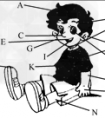根据句意及首字母提示写出所缺单词。1. People in Korea are supposed to b_____ when they meet for the first time.2. In China people often s_____ hands with each -九年级英语
34.say with a smile 微笑地说
35.be glad to do sth.高兴做某事
36.do a good thing (deed) 做一件好事
37.fall ill=be i11 生病,患病
38.take sb. to a hospital 把某人送到医院
39.rain heavily 下大雨
40.on the road 在公路上
41.not know what to do 不知道该做什么
42.just then 正在那时
43.come up 走进,上来
44.in front of 在……前面
45.thank sb. again and again 反复感谢某人
46.drive away (汽车)离开
run away 跑开
take away 拿走
47.right away 立刻
48.right now 此刻,刚才,现在
49.get home 到家 get there 到达哪儿 get here 到达这儿
50. yesterday morning 昨天晚上
51.leave the hospital 离开医院
52.no buses=not any buses 没有车
53.say to sb.对某人说 say to oneself 自言自语
54.fall off 跌落
55.need to get up early 需要早起床
56.hurt my arm 胳膊受伤
57.What's wrong with you?=What's the matter with you? 你怎么了?
58.do one's homework on the computer 在电脑上做作业
59.have four English lessons 上四节英语课
60.once a week 一周一次 twice a year 一年两次 three times a month 一个月三次
61.do more listening and speaking 做大量的听说练习
do some cleaning 扫除
do some washing 洗衣服
do some shopping 购物
62.make good progress in English 在英语方面取得很大进步
63.help a lot in our studies 在学习上给子很大帮助
64.teach sb. English 教某人英语
65.get to school 到达学校
66.give sb.lessons 给某人上课
67.ask sb.to do sth.要求某人做某事
ask sb.not to do sth.要求某人不要做某事
68.let sb. do sth.让某人做某事
1et sb. not do sth.让某人不要做某事
69.not……until 直到……才
70.make one's lessons interesting 使某人的课上的很有趣
71.tell sb. how to do sth.告诉某人怎样做某事
72.try to learn new things be oneself 设法靠自己学一些新的知识
73.want to be a history teacher 想成为一名历史老师
74.grow up 长大
75.in future 在将来
76.computer room (电脑)机房
77.language lab 语言室
78.finish middle school 中学毕业
79.want to become (be) a designer 想成为一名设计家
80.wish to be doctor 希望成为一名医生
81.an American boy 一个美国男孩儿
82.study in a high school 在高中学习
83.in Grade Eight 在八年级
84.finish primary school 小学毕业
85.start school at the age of seven
=begin to school when I was seven 七岁开始上学
86.move to Washington with his family 和他全家搬到华盛顿
87.be interested in 对……感兴趣
88.want to become a doctor of Chinese medicine 想成为一名中医
89.come here to learn Chinese 来这儿学习中文
90.a nice school 一所好的学校
91.instead of 代替
92.in many ways 在许多方面
93.be different from 与……不同
94.by the way 顺便说
95.come back home 回家
96.be sorry for 为…难过,遗憾
97.feel sorry for 为…难过,遗憾
98.burn away 燃烧没了
99.open the door 开门
100.take sb. in one's arms 拥抱某人
101.have some medicine 吃药
102.have a football match 进行一场足球比赛
103.have a meeting 开会
104.walk back 向后走
105.give sth. back to sb. 把某物还给某人
106. work through the night 通宵工作
107.get through the examinations=pass the exam 通过考试
108.happen to 发生
l09.knock at the door 敲门
110.want to do sth. 想做…
111.fall down 掉下来
112.begin to do sth. 开始做…
113.have some tea 喝茶
114.have sports 进行体育锻炼
115.have a bad coId 得了重感冒
116.have a good time 玩的很高兴
117.keep back 向后退
118.so…that 如此…以至于…
考点名称:实义动词的过去分词
- 过去分词的用法也有两个特点:一是表示完成,二是表示被动。
- 实意动词过去分词变化规律和他的过去式变化规律几乎是一样的:
①一般情况直接加ed,如ask—asked,work—worked
②以不发音的e结尾,只加d,如love—loved,dance—danced
③以辅音字母加y结尾,把y变为ied,如try—tried,study—studied
④以一个元音字母和一个辅音结尾的重读音节结尾的动词,先双写末尾一个字母,再加ed,
如stop—stopped,permit—permitted
注意:以l结尾的动词,尾音节重读时,双写l,如control—controlled,尾音节不重读时,双不双写都可以,如travel—traveled/traveled。
特例:picnic—picnicked,另外还有很多动词的过去分词是不合乎上述规则的,需熟记。 实意动词过去式与过去分词的区别:
过去式是发生过的事;
过去分词形式是发生了并且对现在造成影响的事 。
过去式是用来作谓语的
过去分词用于完成时结构的谓语。
另外,在两者的形式也有所差异,有的过去式和过去分词一样 ,有的不一样 .
比如:
begin began begun 就不一样
teach taught taught 就一样
用的时候一定要分清- 过去分词结构:
1. 过去分词独立结构
过去分词有时可有其独立主语,二者构成一种独立分词结构。过去分词独立结构多用于书面语中,常用作状语,用来表示时间、条件、原因、伴随情况等。如:
He rushed into the room,his face covered with sweat.
他满脸是汗跑进屋来。(表伴随)
This done,we went home.
做完此事,我们就回家了。(表时间)
All our savings gone,the couple started looking for jobs.
积蓄全部用完了,这对夫妻就开始找工作。(表原因)
That point settled,the speaker went on to the next one.
那个问题讲完了,演讲人继续讲下一个问题。(表时间)
2. with/without+宾语+过去分词表示伴随情况的独立结构
With everything taken into consideration,we all think this is a very good plan.
每件事都考虑到了,我们都认为这是一项不错的计划。
With different methods used,different results are obtained.
采用不同的方法,得到不同的结果。
She went angrily away without a word spoken.
她一个字也没说,就生气地走了。
3. 过去分词(短语)作宾语补足语
(1) 过去分词(短语)在感官动词和使役动词等之后作宾语补足语,这些词语有: have 让,使 keep 使处于某状态 get 使得
see 看见 hear 听见 find 发现
feel 感觉到 leave 使处于某状态 make 使
want 想要 start 引起 notice 注意
observe 观察 watch 注视 set 使处于某状态
如:
The work left him exhausted.
这个活使得他筋疲力尽。
The doorkeeper heard the chain and bolts withdrawn.
看门人听见门上的链和拴被拉开了。
The tenant found the house renovated.
房客看到房子已整修过了。
It’s better to leave some things unsaid.
有些事倒是不说的好。
I don’t want my name linked with him.
我不要把我的名字和他联系在一起。
The person concerned should like this matter settled immediately.
当事人希望此事立刻得到解决。
(2)过去分词(短语)在使役动词get或have之后作宾语补足语,表示的动作往往是由别人完成的。如:
I had my car repaired
我把我的车修好了。(别人修的)
I had my hair cut
我理发了。(别人给我理的)
We must get the television set repaired
我们必须把电视机修好。(被别人修)
He had his window broken to pieces.
他的窗户给打破了。(被他人打破) - 初中英语不规则动词过去式、过去分词表:
(1)AAA型(动词原形、过去式、过去分词同形)
cost(花费)cost cost
cut(割) cut cut
spit spit/spat spit/ spat(英)
hit(打) hit hit
hurt 伤害) hurt hurt
let(让) let let
put(放) put put
read (读)read read
(2) AAB型(动词原形与过去式同形)
beat(跳动) beat beaten
(3) ABA型(动词原形与过去分词同形)
- 最新内容
- 相关内容
- 网友推荐
- 图文推荐
上一篇:根据所给汉语提示,写出空缺处单词正确形式。1. He was one of the greatest Chinese writers of the 20th _____ (世纪).2. Lao She's Teahouse gives a wonderful_____-八年级英语
下一篇:根据首字母和汉语提示完成单词。1.The play Teahouse shows the a life in China between 1898 and 1945.2.Lao She was b in Beijing in 1899.3.Las She was n a "Peo-八年级英语
零零教育社区:论坛热帖子
| [家长教育] 孩子为什么会和父母感情疏离? (2019-07-14) |
| [教师分享] 给远方姐姐的一封信 (2018-11-07) |
| [教师分享] 伸缩门 (2018-11-07) |
| [教师分享] 回家乡 (2018-11-07) |
| [教师分享] 是风味也是人间 (2018-11-07) |
| [教师分享] 一句格言的启示 (2018-11-07) |
| [教师分享] 无规矩不成方圆 (2018-11-07) |
| [教师分享] 第十届全国教育名家论坛有感(二) (2018-11-07) |
| [教师分享] 贪玩的小狗 (2018-11-07) |
| [教师分享] 未命名文章 (2018-11-07) |






